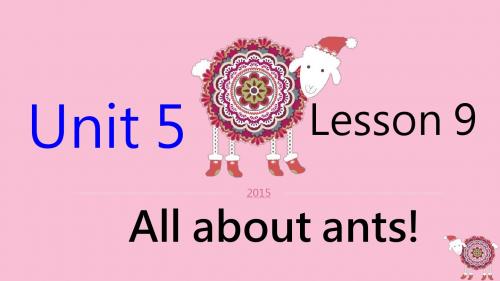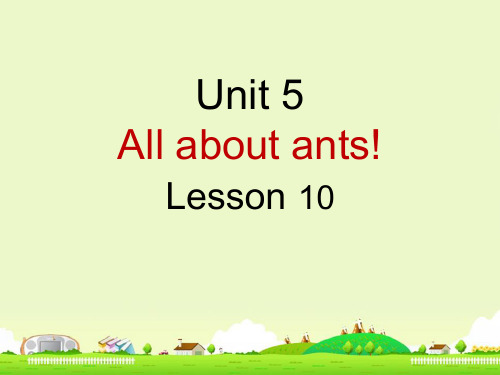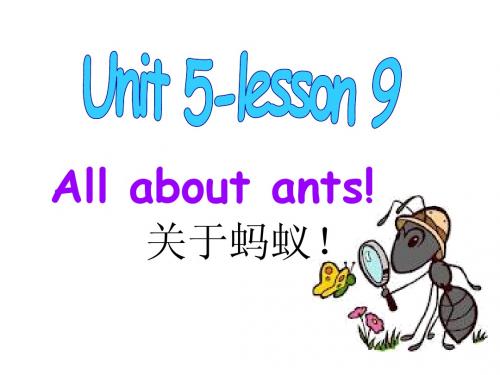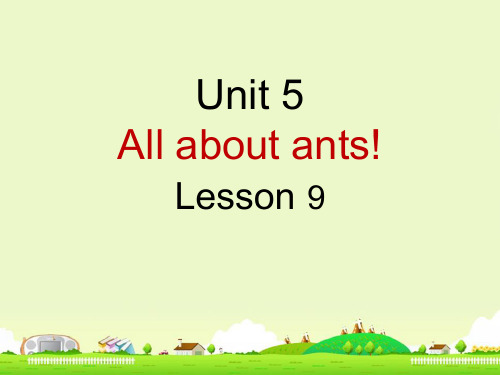新概念英语青少版2aUnit 05:All About Ants
新概念青少版2aUnit5

ROBERT: Look at this webpage , M It’s about ants
KAREN: Ants? Why are you looki
look up (1)抬头看,向上看 (2)(在词典、时刻表等中)查看……
ROBERT: Why not? Ants are really They do really i
Unit 5
Lesson 9
2015
All about ants!
Let's review!
Put on y_o_u_r__g_l_o_v_e_s. Take off y_o_u_r__c_o_a_t.
Turn on _t_h_e__r_a_d_i_o_. Turn offth_e__t_e_l_e_v_i_s_i_o.n
Pick up t_h_o_s_e__l_e_t_t_e.rs Throw away _t_h_a_t__m_a_g_a_z_i.ne
Put up t_h_e__c_u_r_t_a_i_n.s Take down _t_h_a_t__p_i_c_t.ure
Discussion
Do you know ants?
under water f
KARN: Really?
①usually 频度副词 通常放在助动词后或
主要动词前。
同类型词 often 、always、
every week、never、once、
twice
③Really在此处 只是作为
一个感叹词“真的吗?”“不② for 表目的,表原因、表时间……
会吧!”
evening
也 手臂 开玩笑
昆虫 网站 使用 打哈欠 十分有趣的 傍晚
新概念青少版2AUnit5 Lesson10

Let’s spell直接拼读 /pa:/ /ba:/ /ta:/ /da:/ /ka:/ /ga:/ fa:/ /sa:/ /za:/ /wa:/ /ra:/ /la:/ /ja:/ /ha:/
Let’s spell合成拼读 /pa:s/ /ba:k / / sta: / / ga:d / / ha:f / /la:f/ / gla:s / / kla:s / / da:k/ / a:sk /
2.当分钟数是15分钟,45分钟时,可用名词 quarter表示。15分钟又叫一刻钟:a quarter
如:9:15 (三种方法)
11:45
3. 如果分钟数少于等于30分钟,用介词past 表示,用“分钟 + past + 小时”,表示“几 点几分”。 如:6:10 4:20
10:25
4.如果分钟数多于30分钟,可以用“(相差的) 分钟 +介词 to + (下一)小时”,to意思是 “差”
Every day
写出你每天通常在某个时间会做的一件事。 例: I usually--- get up---6:30 (in the morning)
I always--- go to school---7:40 (in the morning) I usually--- arrives home--4:55(in the afternoon) I usually--- do my homework---7:10 (in the afternoon) 然后读给另一个同学听,另一个同学要记下来,并复述。
New words and Expressions
work 工作
telephone call 电话
arrive 到达
2A-Unit5Lesson10Allaboutants!新概念英语青少版小学英语

Pronunciation
ant at back cat had hat
[æ ]
match
'packet
'salad
arm [a:]
park
art aunt
jars march
part
'father
'garden
New Words
write arrive email
Pattern Practice
What time/When do they go to school? They usually go to school at eight (o'clock) in the morning.
Pattern Practice
What do they do at eight o'clock in the morning?
They usually go to school.
Pattern Practice
They don't go to school in the morning. Yes, they do! They go to school at eight o'clock.
Pattern Practice
A:They go to school in the evening. No, they don’t! They go to school in the morning.
Pattern Practice
What's the time? / What time is it? It’s five past six. lt’s five past six in the evening.
青少版新概念2A课文文本(含参考译文)Unit1-15

青少版新概念2A 课文文本 Unit 1-15Unit 1: Linda comes to London 琳达来到伦敦LINDA: Hi, Karen! Where are you?KAREN: I'm in the coffee bar next to the Arrivals exit. I'm waiting for you, and I'm having a cup ofcoffee.KAREN: Where are you, and what are you doing?LINDA: I'm in the Baggage Hall. I'm waiting for my suitcase.LINDA: Ah, I can see it! It's coming round now! There it is!LINDA: Oh, Karen! Is Paul with you?KAREN: Yes, of course he is. He's standing here beside me. I'm giving him my phone now.KAREN: Here you are, Paul! Talk to your mother!PAUL: Hello, Mum!LINDA: Hello, Paul! I've got my suitcase, and I'm coming out now!琳达:嗨,卡伦!你在哪儿?卡伦:我在进港出口旁的咖啡馆。
我正在一边等你一边喝咖啡。
卡伦:你在哪儿?在做什么?琳达:我在行李领取厅,在等我的皮箱。
琳达:啊,我看到箱子了!马上就转过来了!到了!琳达:哦,卡伦!保罗和你在一起吗?卡伦:当然在。
他就站在我身旁。
我现在把电话给他。
卡伦:给,保罗!和你妈妈说说话!保罗:你好,妈妈!琳达:你好,保罗!我拿到皮箱了,马上就出来!Unit 2:Good luck on Sunday! 祝你周日好运!REPORTER: My name's Tom French. I'm speaking to you from the ExCel Centre in London's Docklands. We are visiting this year's Marathon Expo.REPORTER: This is the Trade Fair of the London Marathon.It's very noisy!There are hundreds ofexhibitors and thousands of visitors here.REPORTER: This is a big international event. But it's like a village!People are talkingand laughinglike old friends.REPORTER: I'm standing with one of the competitors.Let me introduce Paul Bruce.Hi, Paul!PAUL: Hi, Tom!REPORTER: Paul, please tell our listeners. This is your first Marathon, isn't it? PAUL: Yes, it is.REPORTER: Are you looking forward to Sunday?PAUL: Yes, I am.REPORTER: That's the spirit, Paul!Good luck on Sunday!记者:我是汤姆·弗兰奇。
青少版新概念2A_unit_5

.
Grammar Points 1
• Look at this webpage.
看
• • • • • •
Practice Look at _____. (I) Look at _____. (she) Look at _____. (he) Look at _____. (they) Look at _____. (we)
• Robert: Why not? interesting • Ants are really______. They do really interesting things. • Karen: What kind of tobert: Well, they_____ dry in ___places. But they two survive under water for___ can_____ weeks. • Karen: Really?
Now let’s read lesson 9 for 3 minutes and answer the
questions.
• Ask questions about the text • 1. • ants/do/interesting things? • →Ants do interesting things. • →Do ants do interesting things? • What kinds of things......? • →What kind of things do ants do?
Grammar Point 3
• Why are you looking up ants? • Why not? Ants are really interesting.
“为什么不呢”, 我们可以用 “why not” 来回答“why”引 导的特殊疑问句
新概念青少版2AUnit5 Lesson9

Homework
1.背诵unit5课文,课堂Role play 2.背诵单词,课堂听写 3.完成练习册unit5
Karen: You’re joking! Robert: No, really!
=What about …?
=What do you think …? 你认为…怎么样?
Karen: Do they usually yawn in the morning, too?
Robert: Well, funnily enough, they do!
evening? 5. Do they usually laugh in the morning, too?
c)
1. Where do ants usually live? 2. How long can they survive under water? 3. Do ants breathe under water? 4. When do ants always stretch their legs? 5. What do they also do in the morning?
3.What kind of places do they usually live in? Where can they survive for two weeks? They usually live in dry place, but they can survive for two weeks under water.
Unit 5 All about ants!
Lesson 9
Can you say something about it? It is … It is … It can … It can … It likes eating …
青少版新概念英语2AUnit5省名师优质课赛课获奖课件市赛课一等奖课件
What time is it?
It’s a quarter past two.
What time is it?
It’s half pas five.
What time is it?
It’s twenty to eight.
What time is it?
It’s a quarter to nine.
3)They always make cake together.
(改否定句)
4)He doesn't go to school by bus.
(改肯定句)
5)I want a hamburger.
(改一般疑问句→否定回答)
Karen: Do they usually yawn in the morning, too?
Robert: Well, funnily enough, they do!
表达they yawn; do 在这里指代前面出 现过旳动词,防止反复出现。
go to school
arrives home
二.只有主语在第三人称单数时用动词旳“三单形式”, 其别人称用动词原形。
动词三单形式旳变化规则: (1)多数直接在动词词尾加-s
play — plays like — likes ask---asks work---works get---gets call---calls (2)以字母s, x, ch, sh或o结尾旳动词,在词尾直接加es. watch---watches wish---wishes do---does go---goes (3)以“辅音字母加- y”结尾旳动词,要先变y为i再加es try---tries study---studies cry---cries fly---flies 不规则变化: be--- is have----has
青少版新概念英语2A-Unit5精讲+听力+答案共53张PPT)
Grammar Point 2
• It’s about ants.
关于
• • • •
Translation (翻译) What’s this about? This song is about friendship(友谊). --What time is it now? --About 3:30.
Grammar Points 1
• Look at this webpage.
看
• • • • • •
Practice Look at _____. (I) Look at _____. (she) Look at _____. (he) Look at _____. (they) Look at _____. (us)
Grammar Point 3
• Why are you looking up ants? • Why not? Ants are really interesting.
“为什么不呢”, 我们可以用 “why not” 来回答“why”引 导的特殊疑问句
Grammar Point 4
• They usually live in dry places. • They don’t usually live in wet places.
• Robert: Why not? interesting • Ants are really______. They do really interesting things. • Karen: What kind of thing?
usually live • Robert: Well, they_____ in ___places. But they dry can_____ two survive under water for___ weeks. • Karen: Really?
2A-Unit5Lesson9Allaboutants!新概念英语青少版小学英语
New Words
look up的意思还有很多,比如“抬头看“ eg.l looked up and saw him. 我抬起头看见了他。
New Words
look up的意思还有很多,比如”改善“
eg.The national economy is beginning to look up. 国民经济正在开始好转。
R: Well, funnily enough, they do!
K: Do they usually yawn in the morning, too?
they do-即ants yawn:助动词do回指前面句子中的主要动 词. funnily enough-当作一个固定的短语,(很奇怪,但却是事 实).
eg.You need to go shopping and I need to go shopping, too.
New Words
insect是一个名词,“昆虫”的意思。
eg.Do you think butterfly is a type of insect? 你认为蝴蝶是一种昆虫吗?
New Words
No, they don’t. They always stretch their legs in the morning.
练习
5.Do they usually laugh in the morning,too? No, they don’t. They usually yawn in the morning.
evening
['i:vniŋ]
adv.十分有趣地 n.手臂,上肢 n.傍晚,黄昏
青少年新概念2A_unit5_All_about_ants_精讲+练习
在一般现在时中,当主语是第三人称单数时,谓语动词要用第三 人称单数形式,即常在动词原形后加-s或-es. 但有些同学们对于 哪些主语是第三人称单数还不十分清楚.现归纳总结如下: 一、人称代词he, she, it是第三人称单数. 如: He likes
week
breathe
stretch
leg
yawn
arm
evening
insect
New words and expressions:
ants insect webpage website look up yawn
蚂蚁 昆虫 网页 网站 查阅 打哈欠
New words and expressions:
三、单数可数名词或"this / that / the+单数可数名词"作 主语 时,是第三人称单数. 如:This book is yours. 这本书是你的. That car is red. The cat is Lucy’s. 这只猫是露茜的.
四、不定代词someone, somebody, nobody, everything, something等及指示代词this, that作主语时,是第三人称单数. 如:Everyone is here. 大家到齐了. This is a pen. 这是一支钢笔.
1.主语+〔am/is /arenot+其它
He isn't an office worker.
2.主语〔除第三人称单数+don't+动词原形 +其它
- 1、下载文档前请自行甄别文档内容的完整性,平台不提供额外的编辑、内容补充、找答案等附加服务。
- 2、"仅部分预览"的文档,不可在线预览部分如存在完整性等问题,可反馈申请退款(可完整预览的文档不适用该条件!)。
- 3、如文档侵犯您的权益,请联系客服反馈,我们会尽快为您处理(人工客服工作时间:9:00-18:30)。
新概念英语青少版2aUnit 05:All About Ants
新概念英语青少版2a课文Unit 05 Lesson 9:All About Ants
ROBERT:Look at this webpage, Mum. It’s about ants.
妈妈,看看这个网页,是讲蚂蚁的。
KAREN: Ants? Why are you looking up ants ?
蚂蚁?你查蚂蚁干啥?
ROBERT: Why not? Ants are really interesting. They do
really interesting things.
为什么不呢?蚂蚁很有趣,它们做的事业非常有趣?
KAREN: What kind of things ?
比如呢?
ROBERT: Well, they usually live in dry place. But they can survive under water for two weeks .
嗯,它们通常住在干燥的地方,但它们却能够在水下存活2周。
KAREN: Really ? Do they breathe under water ?
真的吗?它们在水下呼吸吗?
ROBERT:It doesn’t say .
这个没说。
ROBERT: Oh, Mum, how about this ? Ants always stretch their legs in the morning .
哦,妈妈,这个怎么样?蚂蚁总会在早晨伸伸腿。
KAREN:You’re joking !
你在开玩笑吧。
ROBERT: No, really !
没有,是真的。
KAREN: Do they usually yawn in the morning ,too ?它们早上伸懒腰吗?
ROBERT:Well, funnily enough, they do !
额,有趣吧,它们早上要伸懒腰。
